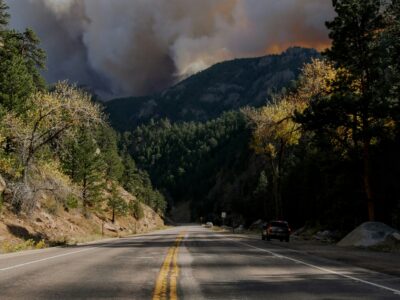The Ins and Outs of Kennedy’s Environmental Positions
His campaign website is a mashup of very different perspectives, from “back to the earth” to tech bro.
I had looked at RFK Jr.’s website earlier in his campaign, and ended up being dissatisfied that his plan to address climate change was unclear. I decided to go back and see if things had changed in the intervening time. Whether or not he stays in the race — currently unclear — his views are interesting in their own right. [As it turned out, Kennedy endorsed Trump just a few days later, perhaps signaling that environmental issues had become a low priority for him.]
Revisiting his campaign website was an interesting experience. It’s a lot spiffier than it used to be and gives more insight into his viewpoint — or perhaps I should say his viewpoints, since they don’t fit neatly together. [As it turned out, Kennedy endorsed Trump just a few days after this blog post went up, perhaps signaling that environmental issues had become a low priority for him.]
The environmental page on the website is entitled “The Best Environmental President in American History” and has a cool photo of Kennedy with a hawk on his arm, both of them looking rather fierce. The page has a list of pledges, each with its own link.
The first pledge is “End the corporate capture of environmental regulatory agencies, including the EPA, USDA, DOI, DOE, USFWS, and USFS.” The page linked with this statement has a lot about Trump, but only one sentence mentioning Biden. That sentence reads: “Biden has loaded federal agencies with corporate insiders.” That in turn links to a page about former Biden aides later becoming lobbyists – a bit of a mismatch for a statement about him hiring people who were already “corporate insiders” to run agencies.
The final pledge takes a related tack, promising to “Stop big corporations and corrupt government officials who are using the environment as an excuse for profit-making schemes and power grabs.” It links to a page that begins by denouncing carbon capture and carbon dioxide disposal pipelines. According to Kennedy, the “carbon pipeline scam, unfortunately, fits a pattern that many Americans now recognize: powerful vested interests have hijacked environmental issues, especially climate change, to shift wealth upward and undermine our democratic rights and freedoms.” He cites no evidence in support of that sentence. Still, this is a lot tamer than his past musings about “Bill Gates and the Davos crowd” suborning the environmental movement.
The page continues that “Kennedy believes that climate change is a serious problem, but as President he will never allow big corporations and government authorities to use climate change as an excuse for profit-making schemes and power grabs.”
Instead, the page advocates regenerative agriculture, ending deforestation, and lowering subsidies for fossil fuels. On a related note, pledges 3 and 4 promise to “protect forests, rivers, fisheries, and wildlife habitats from corporate abuse” and “adopt a wildfire management plan to keep forests resilient and communities safe.” The policy page also makes “Regenerating America’s Soil, Farms, and Food” a main heading, coequal with being the best environmental president ever.
Pledge #2 then completes Kennedy’s “environmental” agenda, promising to “reduce toxic chemical pollution and plastic waste.” The linked page is about limiting plastics, not toxic releases.
There are a lot of other significant pledges on the main policy page, dealing with the economy, Native Americans, and Black communities. Tucked away on the page about economic policy was this: “Cut energy prices by restricting natural gas exports.” That’s an unusual position. Some climate advocates do want to cut gas exports, but with the goal of keeping the gas in the ground, not keeping the gas to use ourselves.
While renewables aren’t mentioned on the “environmental” page, the main policy page does list “Every American Can Be an Energy Entrepreneur” as the aim of Kennedy’s “free-market approach to energy.” The energy issue is far down the list – number 12 – but higher up than “Bitcoin and Blockchain are Essential to Human Freedom.” (Many environmentalists worry about the massive energy demands of cryptocurrencies.) The energy page promises to internalize the costs fossil companies impose on society, which would mean a steep carbon tax (though he doesn’t say so). Once those costs are internalized, Kennedy says – in words that would warm an economist’s heart – “the free market will be able to do its job of punishing waste — pollution is waste — and incentivizing efficiency.”
On some more specific energy issues, Kennedy opposes offshore wind but will support upgrading the grid and “land-based wind in states like Montana, North Dakota, and Texas.” (Don’t forget the Kennedy family campaign to stop a wind farm off Martha’s Vineyard.) Given the “every American an energy entrepreneur” heading, I had expected to see something about rooftop solar or other forms of distributed energy, or maybe electric cars, but didn’t find any of that. I also thought he was going to call for full deregulation of electricity markets, as in Texas, but didn’t see that either.
It seems like whoever wrote the environment page didn’t talk with whoever wrote the energy page. More broadly, working through the website revealed a combination of very disparate themes: distrust of government, fear of big business, belief in free markets (even though they created the big businesses), and a “back to the land” ethic. It adds up to an unusual blend of Sixties-style environmentalism with Tech Bro libertarianism. Not my cup of tea, but we’ll have to wait till November to see how many others find it appealing.
Reader Comments
One Reply to “The Ins and Outs of Kennedy’s Environmental Positions ”
Comments are closed.







RFK Jr.’s climate opinions are irrelevant. Mitigating climate fraud and wasteful government spending is way more relevant to most of us ordinary citizens and we clearly have a choice.
Climate aficionados purport to know how to mitigate the natural process of gradual global climate change. They impose mitigation requirements without sufficient scientific proof so it never works. They offer us no guarantees, no performance warranties, no good faith, forever dishonest, corrupt, evil intentions, banalities, kamala.
Mitigate Climate Fraud – vote for President Trump